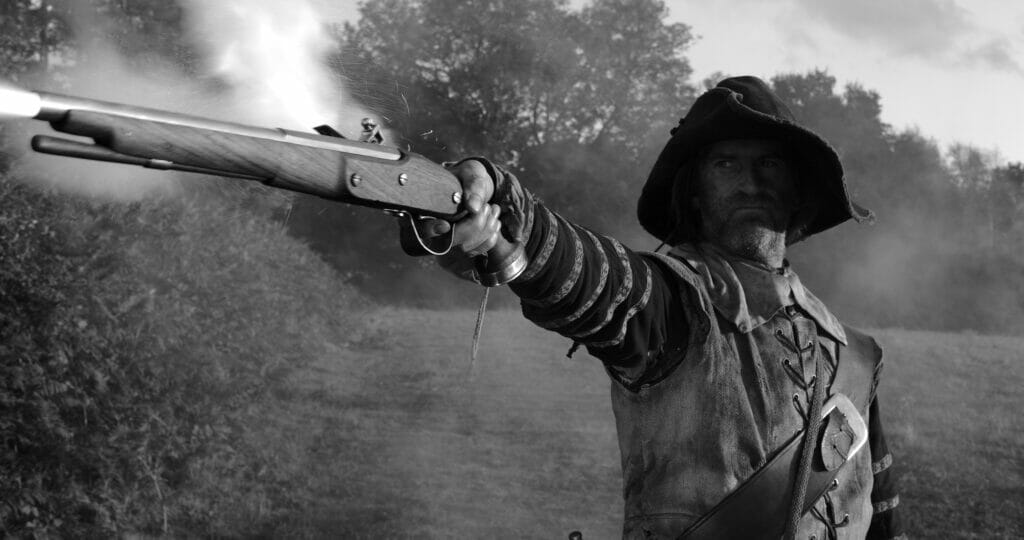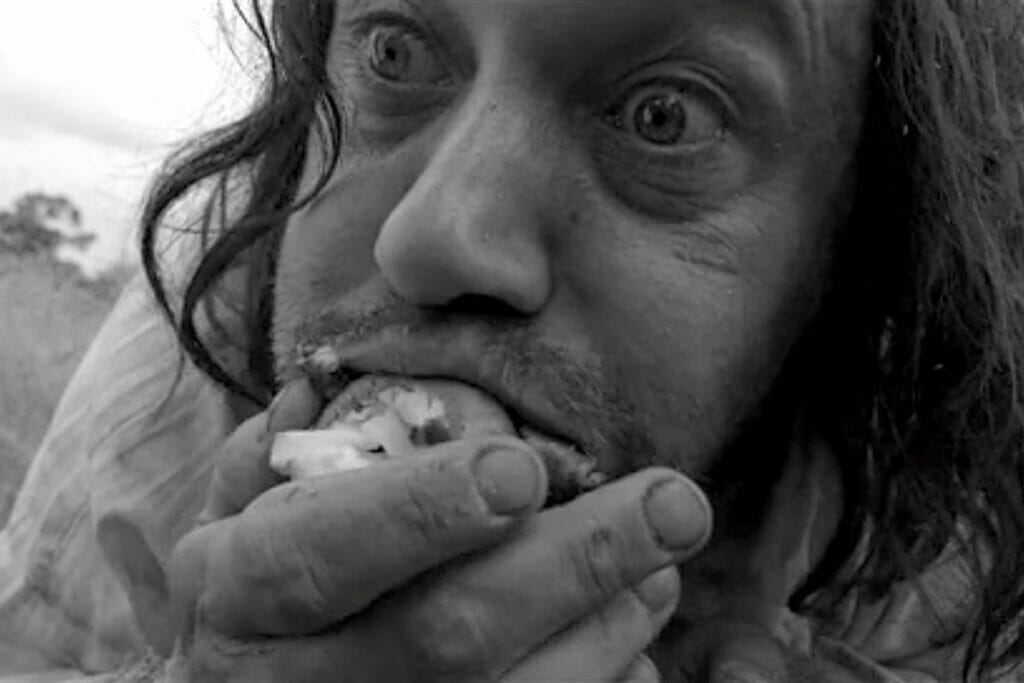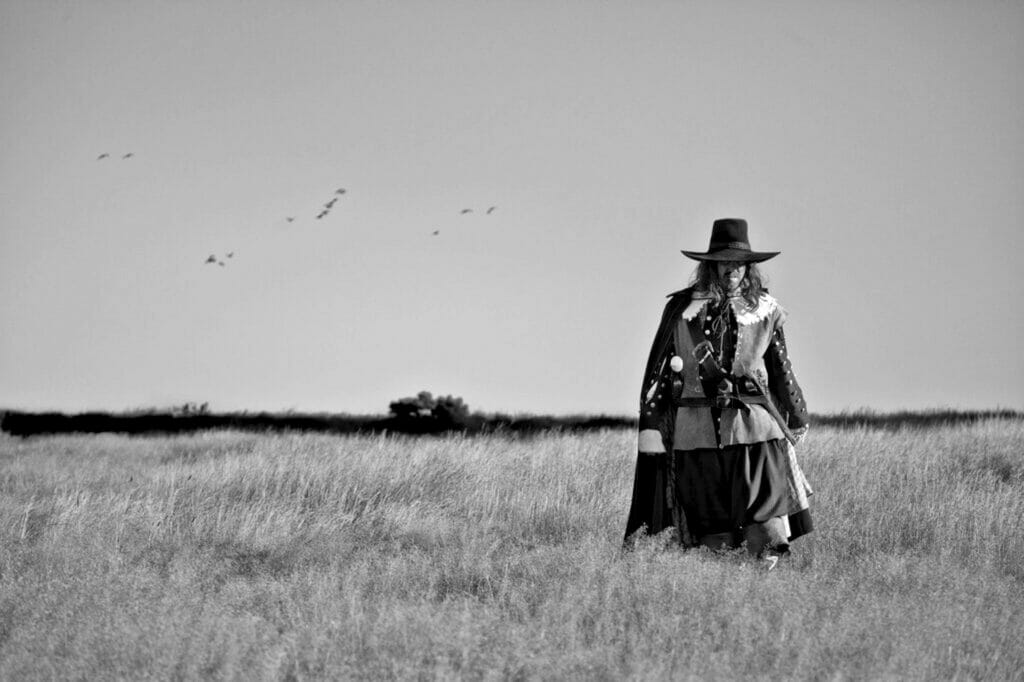Wheatley keeps it eclectic with the most psychedelic offering in his filmography.

Every month, The Spool chooses to highlight a filmmaker whose works have made a distinct mark on the cinematic landscape.
With his love of mixing horror, dark comedy, and crime Ben Wheatley has been flirting with but never breaking through to the mainstream. However, this month that may all change.
This piece was written during the 2023 WGA and SAG-AFTRA strikes. Without the labor of the writers and actors currently on strike, the movies being covered here wouldn’t exist.
Kicking off his career with three features that mixed comedy, crime, and horror in various ratios, Ben Wheatley immediately established a penchant for genre fluidity. But nothing in his early oeuvre suggested the bizarre collection of elements in his witches’ brew of a fourth film. A Field in England landed on screens as a dialogue-heavy black-and-white 17th-century historical dramedy that morphs into a stroboscopic occult psychedelic horror. At a point in his career where many directors would be seeking to shore up a recognizable style and turn their talents to commercially viable products, Wheatley instead delivers his most experimental and befuddling work.
A Field in England begins in a confused hubbub with a stringy-haired man in a starched collar (Reece Shearsmith, as the scholarly Whitehead) crawling through the underbrush in a panic, mumbling a prayer for deliverance while pursued by a man on horseback. The quick-cut editing and the camera’s tendency to focus on indistinct shots of surrounding vegetation puts the viewer into a combatant’s skin, struggling to distinguish friend from foe. As gunshots, war cries, and the pounding of drums ring in the distance, a small-scale melee erupts before us. It results in an answer to Whitehead’s prayer as his pursuer lies dead.

Out of this initial chaos, the film emerges with temporary clarity. As the wider battle moves to another location, Whitehead meets three other refugees. There’s the vulgar Jacob; a simpleton known only as Friend, who initially seems dead but revives at the mention of ale; and Cutler, who suggests the quartet disregard sides and form a temporary alliance. The three deserters, and Whitehead, agree to journey to a tavern Cutler knows, just across the nearby field. Whitehead, an astrologer’s apprentice on a mission to find a colleague who robbed his master of some valuable arcane tome, accompanies them reluctantly, out of fear. To the rest, the promise of an alehouse seems like a vision of Paradise.
This setup quickly leads into the movie’s grand shift, changing from historical reenactment into hallucinogenic folk horror. The crew pauses for a simple meal of mushroom soup. Unfortunately, the broth’s flavor comes from fungi of the hallucinogenic variety. Whitehead, on a religious fast, does not partake. However, the others soon segue into mesmerized-by-the-appearance-of-their-own-hands mode.

Through an inebriated, performed-at-gunpoint game of tug-of-war, the quartet hauls a wizard from the bowels of the earth. It’s none other than O’Neal, the Irishman whom Whitehead has been sent to retrieve. Played with malevolent authority by Wheatley favorite Michael Smiley, O’Neal is a potent magician. The shroom-addled deserters are unable to resist him, as is the sober but timid Whitehead. O’Neal tasks Whitehead with divining the location of a buried treasure and the soldiers with digging it up. Whitehead eventually escapes and voluntarily gobbles a load of free-range mushrooms. Doing so dislodges a cache of telekinetic ability from his constipated psyche leading to a psychedelically-coded battle of wills with O’Neal. Or perhaps it’s all a hallucination. Who’s to say?
Shot on a 300,000-pound budget during a brisk 12-day, single-location shooting schedule, A Field in England is minimalist in its means but maximalist in its ambition. There are few practical special effects and no computer-generated images. Wheatley conjures strange horrors through psychedelic montages made up of frantic editing, distorted lenses, and mirroring tricks. The director would revisit many of these delirious techniques in 2021’s similarly themed and set In the Earth. The luminous black and white cinematography, which shifts between painterly deep focus in wide shots of the fellowship and severely shallow focus for close-ups of the field’s flora and fauna, is itself dreamlike.
A Field in England is a surprisingly funny film.
Jim Williams’ score incorporates English folk songs and melodies but with trippy twists. A strumming acoustic guitar is subsumed into an electronic orchestra, a recorder repeats a childish melody at a tempo that accelerates to the point of insanity. The traditional Scottish folk song “Balloo My Boy,” about a wife stranded with her infant while her husband is away at war, gets a rendition by Friend in a delicate peasant warble. Anything and everything at hand contribute to turning a simple English meadow into a field of psychic combat.
Credit much of A Field in England’s allure to screenwriter Amy Jump, who supplies believable period verbiage and economic characterizations so that we can tell these scraggly Englishmen, otherwise distinguishable only by their choice of headgear, apart. Whitehead tends towards digressions about astrological portents and polite euphemisms like “venereal sport.” At the same time, Jacob resorts to obscenities and colloquialisms, like his desire to “bob off” when he feels “peaky.”
Class distinctions create occasions for amusement amidst the horror. As a result, A Field in England is a surprisingly funny film. Jacob, who suffers from a comically large list of ailments including, notably, constipation, supplies much bawdy humor. Friend, on the other hand, provides most of the comic relief. His dying wish is for his comrades to deliver a message to his wife. “Tell her I hate her.”

While Whitehead is the clear protagonist, an abject coward who finds the fortitude to face an evil sorcerer, Friend is the most enigmatic of the party. Jacob is almost pure comic relief, while Cutler and O’Neal seem more plainly antagonistic. Friend stands apart in that he lacks a proper name, identified only by his role. His thoughts curiously focus on suffering and retribution. At one point, he wonders what God is punishing the crew for. His eventual epiphany? “Everything.” Primarily a clown, he nonetheless approaches holy fool at times. He also apparently dies and comes back to life not once but twice. These suggestions of mystical character don’t solidify into an obvious allegorical reading, but the hints of a deeper purpose add to the tantalizing ambiguity of the exercise.
“What this party lacks is the civilizing influence of women,” muses Jacob. With the English Civil War as a backdrop, A Field in England serves partly as a study of the absurdity of masculine rivalry while still telling a story of genuine heroism. Near the end, it serves up a moral that seems like nothing more than a poor joke on the “the real treasure was the friends we made along the way” cliché. But simplistic lessons aren’t of much interest to this movie. Its warnings are ultimately obscure. Like a good mushroom trip, it offers multiple interpretations. Or, if you prefer, no interpretation at all, just a good mind-melting time with some trippy visuals.